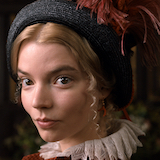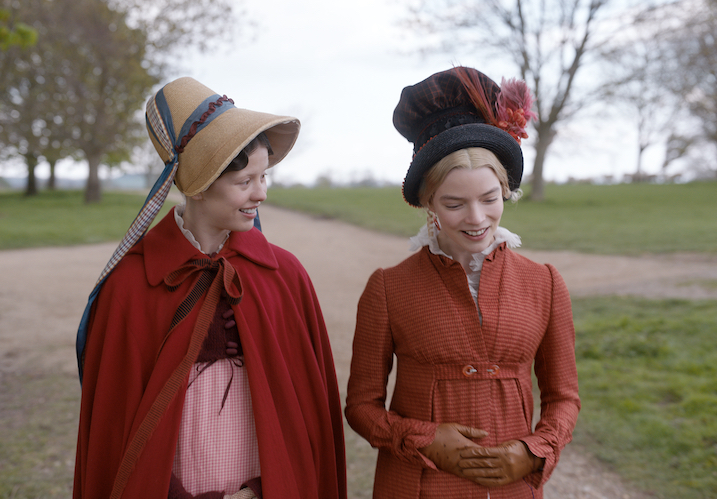Emma FINALLY Gets Her Privilege Checked (Movie Review)

Jane Austen’s last completed work gets a 2020 update. Emma is closer in spirit to the original novel than the Gwenyth Paltrow vehicle from 1996. However, most movie fans know the exploits of the charming, rich, and well-intentioned heroine when she was named Cher in Amy Heckerling’s 1995 teen classic, Clueless. First-time feature director Autumn de Wilde brings her keen eye for set design and stunning colors from her music videos days to the big screen. One of the best-looking costume dramas in years, Emma is funny, witty, and way more brutal (in parts) than past iterations. No doubt, there will be fans as well as detractors (those that just wanted a tasty treat instead of this version’s full meal might be turned off). From this writer’s perspective, though, the time to revel and be shocked by a story like this has been a long time coming.

Emma Woodhouse (Anya Taylor-Joy) wants for nothing. It’s 18th century England, and among her friends and family, she always has something to say. She’s a young woman of action. After her older sister gets married off, Emma becomes her father’s (the always game Bill Nighy) pride and joy. The duo live in a luxurious mansion with servants who are down to bring in ornate portable dividers if ever Lord Woodhouse feels a chill. Yet being a woman in this era affords Emma little except to eventually be married off. She can’t even dream of going into politics to enact any real kind of social reform.
During her endless days and nights, she spends her time as a matchmaker. She knows her friends and family well enough, so why not? Lately, her sights on her somewhat less fortunate chum, Harriet (Mia Goth). Emma is sure she knows best, so she’ll set her up with the handsome albeit kind of annoying Mr. Elton (Josh Connor). There are dances, dining, and all sorts of affairs that would be better, Emma assumes, with a companion. The time to meddle is now.
Yet there’s also the more roguish George Knightley (Johnny Flynn) who’s a lifelong friend of Emma’s. Can she find him someone? Or can she admit he’s Mr. Darcy to her Elizabeth Bennet in the Austen Universe?

The first half of Emma de Wilde presents a terrific send-up of costume dramas that have played before on Masterpiece Theater, etc. The tone is light with production design and costumes that impress. The director has photographed album covers for Fiona Apple, Jenny Lewis, and The White Stripes, to name a few before directing music videos.
There’s a way she balances subjects that can easily turn overly busy – think all the furniture and paintings that fill 18th century English well to do’s homes – yet she knows exactly what our eyes should be focused on. Much like the singers and bands she’s worked with, there’s a razor focus on Emma, our lead.
Alexandra Byrne, who made satin lush and beautiful again in Mary Queen of Scots and designed many super suits for the MCU has a bold, flattering look for nearly everyone in the picture. Taylor-Joy is, visually, the film’s center of gravity. Her dresses are a great blend of form and function. She’s always in control as a character, so her outfits exemplify such a person (even if there are times when she shouldn’t). Color is a huge signifier. From the way reds and yellows fill the screen, to smaller achievements like pattens that withhold blues, whites, and grays. Nothing ever feels like it happened by accident. Much care is given to the visual look.

As the narrative heads toward its last act, though, there’s a palpable sense of pain and brutality I didn’t see coming. No, this doesn’t become Pride & Prejudice & Zombies, but the script by Eleanor Catton begins to unravel the kind of person Emma has become, and how inappropriate and kind of awful Emma can be. The fact is, no matter how much fun a film like this is, Catton wants to wake us up. I won’t spoil anything, but fans of the book will no doubt know what particular scene I’m referring to.
There’s a moment where Emma’s self-satisfied personality hurts someone who, in this era, is below her station. An easier film would let the protagonist off the hook. Maybe she quickly apologizes or does something amazing for the wronged character. Not here. Once the damage is done de Wilde sits on this moment. Emma will not apologize because she can’t really see past her own pride and prejudices (sorry, had to do it). The moment has affected her for sure, and I think we’re led to believe or at least hope Emma will finally grow up, but it’s a mark of strength that de Wilde and her terrific cast and crew that scenes like this let viewers decide how they feel.

As Emma, Anya Taylor-Joy continues to impress not just with her skills as a performer but her choices. From The Witch to this, I have I no idea what’s next for her or de Wilde, but I look forward to it. Like so many delicious treats seen in the film, Taylor-Joy’s big eyes can’t help but want to take it all. That’s Emma in a nutshell. She’s gotta have it.
A film like Emma. is a kind of indie miracle. The way we’re dropped in a setting so fabulous yet has something to say about the world we live in now is fantastic (a moment where the characters are overwhelmed by the sheer volumes of paintings to take in feels like Bizarro Mansfield Park via Instagram). There are many clever moments, joyous sets, and great chemistry between the romantic leads. I’m just so happy there’s even more to 2020’s Emma than just a period.
![]()
![]()
![]()
![]()
![]()


















